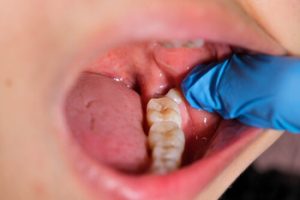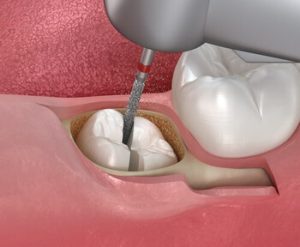If you’ve ever experienced the discomfort of an infected wisdom tooth, you know how disruptive it can be to your daily life. Wisdom teeth, also known as third molars, are the last set of adult teeth to erupt, usually emerging in your late teens or early twenties. While they may not always cause issues, they often become a source of dental problems when there isn’t enough room in your mouth for them to emerge properly. Let’s explore everything you need to know about infected wisdom teeth, from causes and symptoms to treatment options and recovery.
What Is an Infected Wisdom Tooth?
An infected wisdom tooth occurs when harmful bacteria invade the gum tissue surrounding the tooth. This is common in cases where the wisdom tooth partially emerges or becomes impacted, leading to a gum flap where food particles and bacteria can accumulate. If left untreated, this infection can cause severe pain, swelling, and other complications.
Why Do Wisdom Teeth Cause Problems?
Wisdom teeth can be a nuisance for several reasons:
- Insufficient Room: Many people simply don’t have enough room in their mouths to accommodate four wisdom teeth.
- Impacted Wisdom Teeth: These occur when a wisdom tooth pushes against neighbouring teeth or becomes trapped under the gum tissue or jawbone.
- Partial Eruption: When wisdom teeth only partially emerge, they create a perfect environment for harmful bacteria to thrive, leading to tooth decay, gum disease, and infection.
Symptoms of a Wisdom Tooth Infection
How do you know if your wisdom tooth is infected? Look out for these common symptoms:
- Severe Pain: Pain in the affected area, often radiating to the jaw or ear.
- Swollen Gums: Gums around the wisdom tooth may become red, tender, and inflamed.
- Bad Breath and Foul Taste: These are caused by food particles and bacteria trapped near the gum flap.
- Facial Swelling: Swelling around the jawline may also occur.
- Bleeding Gums: The gum tissue may bleed easily.
- General Discomfort: A dull ache or persistent irritation in the back of the mouth.
- Difficulty Chewing: Pain and inflammation can make it hard to eat or talk.
Risks of Leaving an Infected Wisdom Tooth Untreated
Ignoring a wisdom tooth infection can lead to more serious health problems, including:
- Gum Disease: Chronic inflammation can damage the surrounding gum tissue and lead to periodontal disease.
- Tooth Decay: The infection can spread to neighbouring teeth, causing cavities and decay.
- Further Complications: In rare cases, the infection can enter the bloodstream or respiratory tract, leading to systemic health issues.
- Other Health Problems: Persistent infection may weaken your immune system and exacerbate existing conditions.
Treatment Options for Wisdom Tooth Infections
Treating an infected wisdom tooth typically involves a combination of immediate care and long-term solutions.
Home Remedies for Immediate Relief
While waiting to see your dentist, try these simple remedies to ease discomfort:
- Warm Salt Water Rinse: Gargling with warm salt water can reduce swelling and eliminate harmful bacteria.
- Soft Food: Opt for a soft diet to minimise irritation to the affected area.
- Pain Relief: Over-the-counter painkillers can help manage discomfort temporarily.
Antibiotics
For severe infections, your dentist might prescribe antibiotics to target and eliminate harmful bacteria.
Wisdom Tooth Extraction
For long-term relief, a dental professional may recommend wisdom tooth removal. This procedure is particularly common for impacted wisdom teeth or cases where there is insufficient room for the wisdom tooth to emerge properly.
Drainage and Cleaning
In some severe cases, the dentist may drain the infection and thoroughly clean the affected area to remove bacteria and food particles.
What Happens During Wisdom Tooth Removal?
 Wisdom tooth extraction is a standard procedure performed by experienced dentists. Here’s what you can expect:
Wisdom tooth extraction is a standard procedure performed by experienced dentists. Here’s what you can expect:
- X-Rays: X-rays will be taken by your dentist to evaluate the position of your wisdom teeth and plan the most suitable treatment.
- Anaesthesia: The procedure is typically done under local or general anaesthesia to ensure comfort.
- Extraction: The dentist will remove the tooth, and in some cases, a small portion of the gum tissue or jawbone may be removed to access the tooth.
Recovery After Wisdom Tooth Extraction
Recovery time varies but generally lasts about a week. To heal successfully, follow these tips:
- Rest: Ensure you rest and avoid strenuous activities during the first 24 hours after surgery.
- Avoid Straws: Refrain from using straws, as the suction can dislodge the blood clot and result in a dry socket.
- Oral Hygiene: Gently rinse with warm water or salt water, but avoid vigorous brushing near the affected area.
- Follow Up: Attend follow-up appointments to ensure proper healing.
When Should You Call Your Dentist?
Don’t wait for symptoms to worsen. See a dentist if you experience:
- Persistent or severe pain
- Swelling that doesn’t subside
- Difficulty opening your mouth
- Symptoms like fever or chills could indicate a systemic infection.
How to Stay Ahead of Wisdom Tooth Infections
Prevention is always better than cure. Maintain good oral hygiene to limit the risk of infections:
- Brush and Floss Daily: Pay more attention to the back of your mouth.
- Regular Dental Checkups: Your dentist can track the development of your wisdom teeth and recommend preventive measures.
- Early Extraction: If your dentist identifies potential problems, early removal of wisdom teeth can prevent complications.
FAQs About Infected Wisdom Teeth
- How can I tell if my wisdom tooth is infected?
Signs of an infected wisdom tooth include swelling, pain, bad breath, and difficulty chewing. If these symptoms occur, schedule a visit to your dentist without delay.
- What causes wisdom teeth to become impacted?
Impacted wisdom teeth develop when there isn’t enough room for the teeth to emerge properly. This can lead to misalignment and complications.
- Can an infected wisdom tooth heal without treatment?
No, an infected wisdom tooth will not heal on its own. Proper dental care, including possible antibiotics or extraction, is necessary to resolve the infection.
- Is wisdom tooth removal always necessary for an infection?
Not necessarily. Sometimes, antibiotics and professional cleaning can manage the infection. However, recurring infections may necessitate wisdom tooth extraction.
- What is a dry socket, and how can I avoid it?
A dry socket occurs when the blood clot at the extraction site is disturbed or removed, leaving the underlying bone and nerves exposed. Avoid using straws, smoking, or vigorous rinsing after a tooth extraction to prevent this condition.
- How long does it take to recover from wisdom tooth extraction?
Recovery typically takes about a week. Following your dentist’s aftercare instructions can help speed up the healing process.
- Are all wisdom teeth removed at once?
It depends on the case. Some patients may need all four wisdom teeth removed at once, while others may only require the removal of problematic teeth.
- Can home remedies completely treat a wisdom tooth infection?
Home remedies can provide temporary relief but won’t cure the infection. Professional dental treatment is required to address the root cause.
- How do I know if I need wisdom tooth removal before symptoms appear?
Regular dental checkups and X-rays can help your dentist determine if early wisdom tooth removal is necessary to prevent future problems.
- Can an infected wisdom tooth cause problems beyond the mouth?
 Yes, in rare cases, an untreated infection can spread to other parts of the body, such as the bloodstream or respiratory tract, leading to serious health issues.
Yes, in rare cases, an untreated infection can spread to other parts of the body, such as the bloodstream or respiratory tract, leading to serious health issues.
- Are there any risks associated with wisdom tooth removal?
Wisdom tooth extraction is generally safe. However, minor risks include dry sockets, infection, and temporary numbness. Your dentist will walk you through these risks before the procedure.
- Can I prevent wisdom tooth infections?
Good oral hygiene and routine dental checkups are key to preventing wisdom tooth infections. If your dentist identifies potential risks, preventive measures like early removal can be considered.
Final Thoughts: Keeping Your Smile Healthy
Infected wisdom teeth can result in intense pain and may lead to serious health issues if not addressed. Whether it’s impacted wisdom teeth, gum disease, or other dental concerns, timely diagnosis and treatment are essential. Be sure to consult your dentist to discuss available solutions and maintain your oral health.
If you’re experiencing symptoms of a wisdom tooth infection, don’t delay—schedule a consultation with Beyond Infinity Dental at (02) 8806 3799 to discuss your options for treatment and recovery.
Note: Any surgical or invasive procedure carries risks. Before proceeding, you should seek a second opinion from an appropriately qualified health practitioner.
References:
- Healthline. (n.d.). Dental anesthesia: What to expect. Retrieved from https://www.healthline.com/health/dental-and-oral-health/dental-anesthesia
- Cleveland Clinic. (n.d.). Wisdom teeth removal. Retrieved from https://my.clevelandclinic.org/health/treatments/22119-wisdom-teeth-removal
- WebMD. (n.d.). Gingivitis and periodontal disease. Retrieved from https://www.webmd.com/oral-health/gingivitis-periodontal-disease









